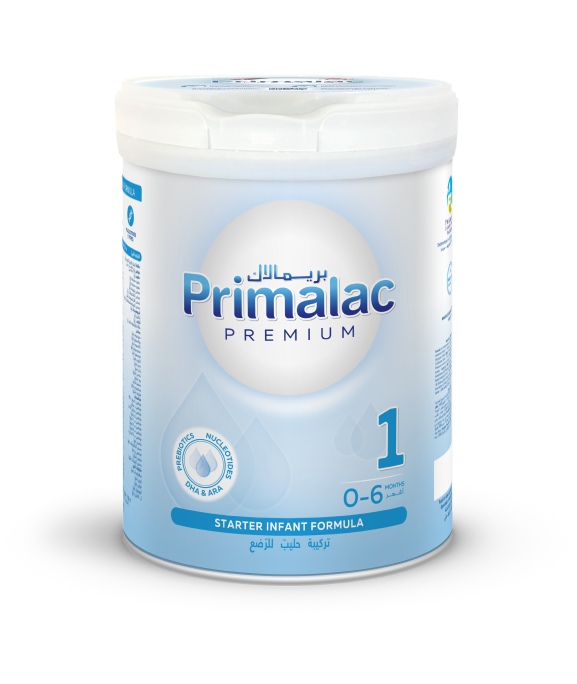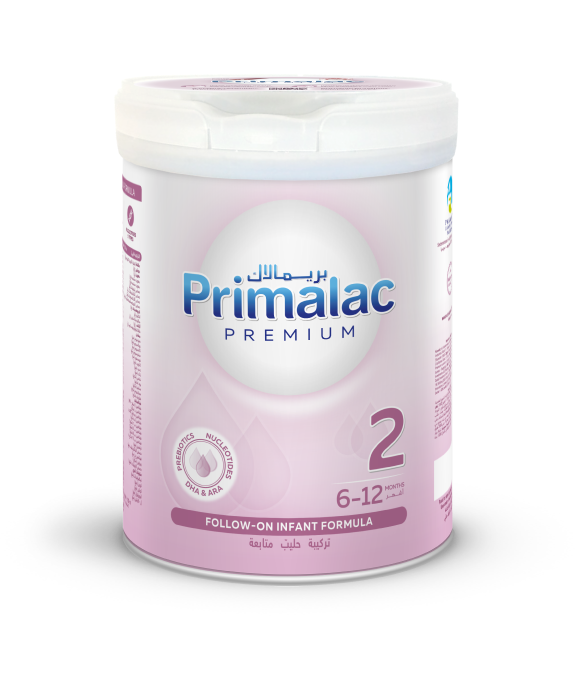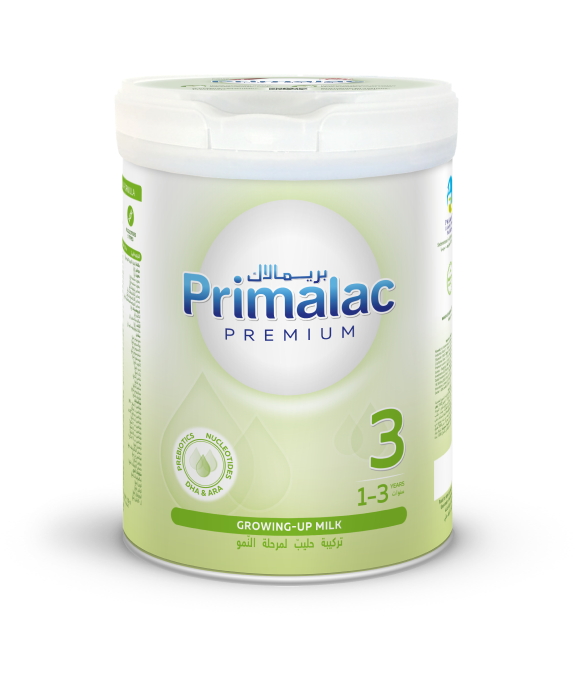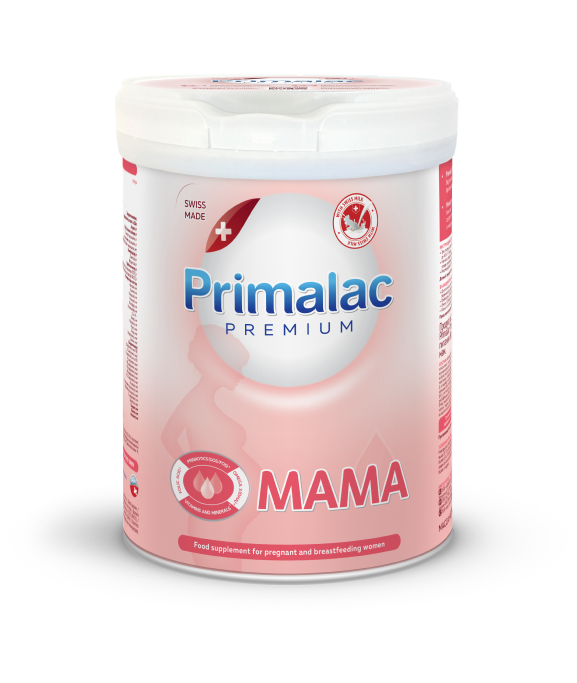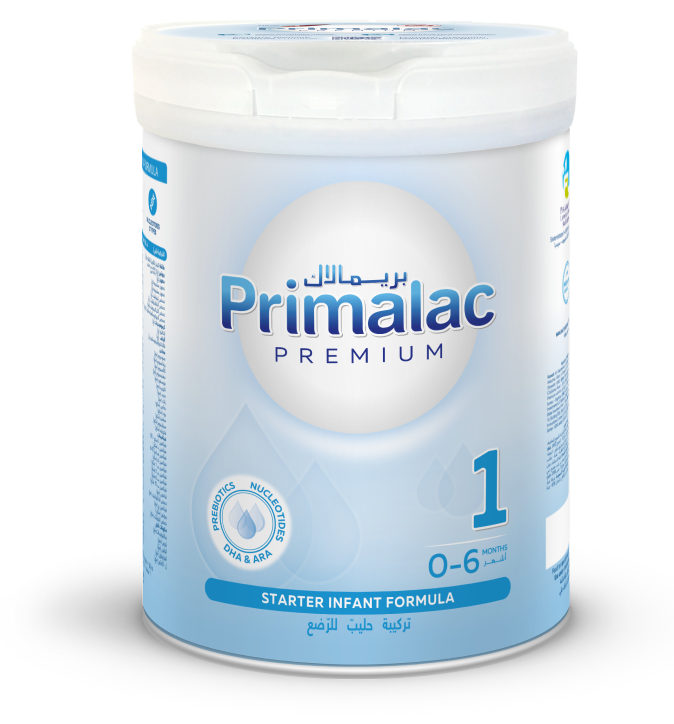Contact Us
Write to us, and we will get back to you promptly
Help Us Choose the Right Product for You!
Tell us a bit about your feeding journey to get started
Primalac Mama
Our bestsellers

A nutritious milk drink designed for pregnant and breastfeeding women, Primalac MAMA offers a balanced composition to ensure that both you and your baby receive all the essential nutrients needed for optimal health and development
Breast-feeding
Feeding
When and How Often Should You Feed Your Baby?
Feed your baby whenever they show signs of hunger. Trust your instincts—offering the breast based on your baby’s cues will ensure they receive the nourishment they need. Within just a few days, your body will adjust to produce the right amount of milk. If your baby's appetite increases, they will naturally seek the breast more often. This increased demand will stimulate your milk production, leading your body to adapt accordingly. As your supply increases, you may notice longer intervals between feedings.
Is My Baby Getting Enough Milk?
The amount of milk your baby consumes can vary from feeding to feeding and day to day. A reliable indicator that your baby is receiving enough breast milk is having four to five wet diapers daily. Additionally, periodic weight checks can help you monitor their growth and ensure they're thriving.
Transitioning from Breast Milk to Infant Formula
To gradually reduce your milk supply without causing discomfort, replace breastfeedings one at a time with formula. This approach helps your baby adapt to new types of nourishment while still receiving your love and attention during the transition. By introducing formula gradually, you can ensure a smoother transition for both you and your baby.
Formula feeding
Feeding
When should I start formula feeding my baby?
How do I transition my baby from one formula to another?
Gradually mix the new formula with the current one, starting with a small amount and increasing the proportion of the new formula over several days to help your baby adjust.
At what age can my child drink cow's milk?
It is generally recommended to introduce cow's milk into your child's diet around 12 months of age, as breast milk or formula provides essential nutrients for infants before this age.
You can begin formula feeding when you decide to supplement or replace breastfeeding, typically around 6 months, but it can start earlier if necessary.
Complementary feeding
Feeding
What rules should I follow when introducing complementary foods?
When prescribing complementary foods, it's important to ensure they are introduced gradually and in accordance with your baby's developmental readiness. Focus on providing a variety of nutrient-rich foods that complement breast milk or formula.
What types of foods are recommended for complementary feeding?
Start with single-grain cereals, pureed fruits and vegetables, and gradually introduce proteins such as pureed meats or legumes. Ensure that the foods are appropriately textured for your baby's age and developmental stage.
Where can I find more guidelines on complementary feeding?
Refer to our comprehensive guideline for detailed recommendations on the timing, types of foods, and tips for successful complementary feeding.
Amount of mixture drunk
Feeding
Should my baby finish the entire bottle of formula?
How many bottles of formula should my baby consume each day?
Typically, infants need about 24 to 32 ounces of formula per day, divided into 4 to 6 feedings. This amount may vary based on your baby's age and weight, so consult your pediatrician for personalized advice.
What signs indicate that my baby is getting enough formula?
You can tell if your baby is getting enough formula by monitoring their weight gain, diaper output, and overall contentment. A well-fed baby usually has several wet diapers daily and appears satisfied between feedings.
It’s normal for babies to leave some formula in the bottle. Allow your baby to drink until they are satisfied, as their appetite can vary from feeding to feeding.
Hygiene
Feeding
How should I clean my baby’s bottles and nipples?
Bottles and nipples must be thoroughly washed with hot, soapy water immediately after each feeding to remove any milk residue.
Is sterilization necessary for baby bottles?
Yes, it’s important to sterilize bottles and nipples regularly, especially for newborns and infants under 12 months, to eliminate any harmful bacteria.
What are the best methods for sterilizing baby bottles?
You can sterilize bottles and nipples by boiling them in water for 5-10 minutes, using a steam sterilizer, or by running them through a dishwasher with a sterilizing cycle.
Choosing the Right Infant Formula
tips from Experts
What should I look for when selecting an infant formula?
When choosing an infant formula, look for one that closely mimics the nutritional profile of breast milk, including essential proteins, fats, carbohydrates, vitamins, and minerals tailored to your baby’s age and specific needs.
How can I determine if my baby is responding well to the formula?
Should I consult a pediatrician before choosing a formula?
Yes, consulting with a pediatrician is highly recommended. They can provide personalized advice based on your baby's health, dietary needs, and any potential allergies, ensuring you select the best formula for your little one.
Monitor your baby's growth, weight gain, and overall behavior. Signs that your baby is responding well include regular wet diapers, a satisfied demeanor after feeding, and steady weight gain.
Bottle and its storage
tips from Experts
What temperature should the water be for diluting formula?
The water used for diluting formula should be lukewarm, around 37°C (98.6°F), to ensure proper mixing and comfort for your baby during feeding.
How should I store prepared formula?
Prepared formula should be stored in the refrigerator and used within 24 hours. If your baby doesn’t finish a bottle, it should be discarded within one hour to prevent bacterial growth.
What is the best way to warm a bottle of formula?
The best way to warm a bottle of formula is to place it in a bowl of warm water or use a bottle warmer. Avoid using a microwave, as it can create hot spots and potentially burn your baby’s mouth.
Mom's nutrition. Is there «for two»?
tips from Experts
What nutrients are most important during pregnancy?
Key nutrients during pregnancy include folic acid, iron, calcium, and omega-3 fatty acids. These nutrients support your baby's development and help maintain your health throughout pregnancy.
Should I increase my calorie intake while pregnant?
While you may need to increase your calorie intake, it’s more about the quality of those calories than the quantity. Focus on nutrient-dense foods rather than empty calories to ensure you and your baby receive the essential nutrients needed for healthy growth.
Is it necessary to take prenatal vitamins?
Yes, prenatal vitamins are often recommended to help fill any nutritional gaps in your diet. They typically contain essential vitamins and minerals that are crucial for your baby's development and your overall health during pregnancy. Always consult with your healthcare provider to determine the best options for your individual needs.
Early Development: Is It Necessary?
tips from Experts
Is early development truly essential for my child's future?
What activities should I focus on to promote early development?
Activities such as reading, singing, playing, and engaging in sensory experiences are vital. These activities help build language skills, improve motor function, and foster emotional connections, all of which are essential for overall development.
Yes, early development is crucial as the first few years of life are critical for brain growth and learning. Engaging your child in stimulating activities during this time can positively influence their cognitive, social, and emotional skills, laying a strong foundation for future learning.
How much time should I dedicate to early development activities each day?
While the amount of time can vary, aim for at least 20-30 minutes of focused interaction each day, combined with unstructured playtime. The key is to make these activities enjoyable and part of your daily routine, allowing your child to learn and grow through play.
Important Nutrients for My Baby
tips from Experts
What are the essential nutrients my baby needs for healthy growth?
Your baby needs a variety of essential nutrients, including proteins for growth and repair, carbohydrates for energy, healthy fats for brain development, vitamins for immune support, and minerals like calcium and iron for bone health and blood production.
How can I ensure my baby is getting enough of these nutrients?
What signs should I look for to know if my baby is well-nourished?
Signs of good nutrition in babies include consistent weight gain, meeting developmental milestones, having a healthy appetite, and producing regular wet and dirty diapers. If you have concerns about your baby's nutrition or growth, it's always best to consult with a healthcare professional.
You can ensure your baby receives the necessary nutrients by providing a balanced diet that includes a variety of foods appropriate for their age, such as pureed fruits, vegetables, cereals, and proteins. Consulting with a pediatrician or nutritionist can also help tailor a diet plan to meet your baby's specific needs.
Breast Pump Usage Extends Nursing Duration, New Study Finds
Science Library
Research from Yale School of Medicine has shed light on the benefits of breast pumps, showing that mothers who use breast pumps often extend their breastfeeding duration by an average of 21 weeks longer than mothers who do not. Breastfeeding provides crucial nutrients and antibodies that bolster an infant's immune system, making it a cornerstone of early nutrition.
The findings highlight how access to breast pumps and proper education on their use can positively impact breastfeeding rates. For mothers returning to work or experiencing other challenges with direct breastfeeding, breast pumps offer a flexible alternative, allowing infants continued access to breast milk’s nutritional and health benefits over an extended period.
The findings highlight how access to breast pumps and proper education on their use can positively impact breastfeeding rates. For mothers returning to work or experiencing other challenges with direct breastfeeding, breast pumps offer a flexible alternative, allowing infants continued access to breast milk’s nutritional and health benefits over an extended period.
Parental Hesitancy to Taste Baby Food Reveals Quality Concerns
Science Library
A new study has found that one in ten parents have never tasted the ready-made baby food they serve their infants. This reluctance often stems from the food’s unappealing appearance or texture, which can signal lower quality. Researchers argue that tasting baby food could help parents make better-informed decisions and feel more confident in the products they choose for their children.
The study underscores the importance of parental involvement in assessing baby food quality. When parents engage directly with these products, they may feel empowered to advocate for higher standards and make choices that best support their infants' nutrition and development.
The study underscores the importance of parental involvement in assessing baby food quality. When parents engage directly with these products, they may feel empowered to advocate for higher standards and make choices that best support their infants' nutrition and development.
Why We Include HMO in Primalac Ultima: Elevating Infant Nutrition
Science Library
At Primalac, we are dedicated to creating formulas that align closely with the benefits of breast milk. That’s why we include Human Milk Oligosaccharides (HMO), an essential component naturally present in breast milk. HMOs are scientifically proven to enhance a baby’s overall health, ensuring they get the vital nutrients needed for strong and balanced development.
Our formula with HMO does more than just provide nutrition. HMOs contribute to healthy microbial diversity in your baby’s system, which is essential for digestion and nutrient absorption. Additionally, they act as a protective layer, reducing the likelihood of harmful substances interacting with your baby’s system, which supports their resilience as they grow.
With Primalac Ultima, we aim to give your baby a formula designed with precision and care. By adding HMOs, we bring you closer to the gold standard of infant nutrition, helping your little one thrive through every stage of their early development. Your baby deserves the best, and we’re proud to support their journey with innovative, science-driven care.
Our formula with HMO does more than just provide nutrition. HMOs contribute to healthy microbial diversity in your baby’s system, which is essential for digestion and nutrient absorption. Additionally, they act as a protective layer, reducing the likelihood of harmful substances interacting with your baby’s system, which supports their resilience as they grow.
With Primalac Ultima, we aim to give your baby a formula designed with precision and care. By adding HMOs, we bring you closer to the gold standard of infant nutrition, helping your little one thrive through every stage of their early development. Your baby deserves the best, and we’re proud to support their journey with innovative, science-driven care.
Advances in Iron-Enriched Formula to Combat Infant Anemia
Science Library
Anemia is a common issue among infants, especially in regions where iron-rich foods are less accessible or where exclusive breastfeeding without supplementation is prevalent. Research has led to the development of iron-enriched formulas that cater to infants’ increased need for this crucial mineral. Iron is essential for brain development, oxygen transport, and overall growth, and fortified formulas have been shown to reduce rates of anemia and iron deficiency.
These advancements are crucial as iron deficiency in infancy can lead to developmental delays and health issues. By incorporating appropriate iron levels in infant formulas, manufacturers can offer an effective solution for supporting healthy growth, particularly for infants who may be at risk of anemia due to dietary limitations or other factors.
These advancements are crucial as iron deficiency in infancy can lead to developmental delays and health issues. By incorporating appropriate iron levels in infant formulas, manufacturers can offer an effective solution for supporting healthy growth, particularly for infants who may be at risk of anemia due to dietary limitations or other factors.
Omega-3 and DHA in Infant Formula for Brain and Vision Development
Science Library
New research underscores the importance of Omega-3 fatty acids, particularly DHA, in infant nutrition for supporting brain and vision development. These essential fatty acids are naturally found in breast milk and play a pivotal role in neural and cognitive growth, making them a critical component in modern infant formula. Formulas enriched with DHA are now widely recommended by healthcare professionals to support cognitive milestones and visual acuity in infants.
Studies show that infants who receive formula fortified with Omega-3 and DHA exhibit improved cognitive and visual outcomes compared to those who do not. By providing these essential nutrients, formulas can help bridge nutritional gaps for infants who may not be breastfed, offering vital developmental benefits and supporting long-term brain health.
Studies show that infants who receive formula fortified with Omega-3 and DHA exhibit improved cognitive and visual outcomes compared to those who do not. By providing these essential nutrients, formulas can help bridge nutritional gaps for infants who may not be breastfed, offering vital developmental benefits and supporting long-term brain health.
From Farm to Bottle
All about Primalac Formula
What Makes Primalac Formula Unique?
Primalac formula is designed to provide balanced nutrition that closely resembles the benefits of breast milk. Enriched with essential nutrients, our formula includes vital components such as DHA for brain development, probiotics to support a healthy digestive system, and carefully selected proteins to promote optimal growth. Our formulations are crafted in alignment with the latest scientific research and global health guidelines, ensuring that every bottle supports infants’ health and development during these crucial early years.
Advanced Nutrition Tailored for Your Baby’s Needs
Primalac formula is fortified with a comprehensive mix of vitamins and minerals that support healthy growth and immune function. By incorporating elements such as iron for brain development and vitamin D for bone health, Primalac ensures that infants receive a complete nutritional profile. Our formula is also free from artificial colors and preservatives, reflecting our commitment to providing wholesome and natural nutrition that parents can trust.
Tested for Safety and Purity
We are committed to rigorous quality testing at every stage of production. From raw ingredients to the finished product, Primalac formula undergoes extensive safety assessments, ensuring it meets the highest global standards. Our dedication to excellence means that each bottle is safe, nutritionally complete, and ready to support your baby's growth and development with every feeding.
Our cows: the foundation of primalac quality
All about Primalac Formula
Where does our milk come from?
At Primalac, we believe that quality begins with the source. Our cows are raised on expansive, natural pastures, where they roam freely and graze on a balanced, natural diet. This commitment to ethical and sustainable farming ensures that our cows are not only healthy but also provide the best quality milk for our formula.
Caring for our cows
Our cows receive the highest level of care, from regular health check-ups to a diet crafted to support their well-being. By prioritizing their health and happiness, we create an environment that promotes the production of rich, wholesome milk full of essential nutrients for infant development.
Sustainable practices in every step
By working with trusted farmers who share our commitment to sustainable practices, we ensure that every batch of milk used in Primalac formula meets the highest quality standards. From pasture to bottle, our process is designed to bring only the best to your baby’s nutrition, all while supporting the environment and the communities we work with.
The science of Primalac formula development
All about Primalac Formula
What goes into creating the perfect formula?
Formulated with care, supported by science
Each Primalac formula undergoes rigorous testing and research-backed adjustments to meet the highest standards in infant nutrition. Our team of nutritionists and pediatric experts work together to ensure that every bottle delivers complete, safe, and nourishing meals tailored to the developmental needs of babies and young children.
Developing Primalac formula is a meticulous process guided by science and the latest research in infant nutrition. Every ingredient is carefully selected and balanced to ensure that our formula provides the essential nutrients infants need for healthy growth and development. From proteins that support cellular growth to DHA and ARA for brain and eye health, Primalac formula is designed to closely mimic the nutritional benefits of breast milk.
Quality control and safety at every step
Primalac's commitment to quality doesn't stop at formulation. Every batch undergoes strict quality controls, from ingredient sourcing to final production, to ensure purity and safety. We adhere to globally recognized standards to guarantee that parents can trust every scoop of Primalac formula, knowing it has been crafted with precision and care to give infants the best possible start.
Essential vitamins and minerals in primalac formula
All about Primalac Formula
What key nutrients does Primalac provide for growing infants?
Primalac formula is enriched with essential vitamins and minerals that support all aspects of infant growth and development. Key nutrients like vitamin D, calcium, and iron are carefully balanced to promote bone strength, cognitive function, and healthy blood production. These elements are vital during the early stages of life when infants are rapidly developing and need comprehensive nutritional support.
A commitment to optimal health in every scoop
Primalac’s formula is developed to provide a broad spectrum of nutrients, reflecting our dedication to supporting infant health at every stage. Each ingredient is sourced with care and added in precise amounts, ensuring that parents can rely on Primalac to provide balanced nutrition that meets the latest health standards and gives their little ones the best possible foundation for growth.
Supporting strong bones, brain development, and immunity
Vitamin D and calcium work together to build strong bones and teeth, supporting motor development as babies grow. Iron plays an essential role in brain development and healthy red blood cell production, helping babies thrive physically and cognitively. Additionally, Primalac formula includes antioxidants like vitamins C and E to strengthen immunity, supporting infants as they explore their world.
OPO Lipids in Primalac Ultima: Nutrition Inspired by Mother’s Milk
All about Primalac Formula
At Primalac, we are dedicated to providing your baby with the closest possible benefits to those of mother’s milk. One of the key innovations in our formula is the inclusion of OPO lipids (Oligopalmitates), structured fats naturally found in breast milk. These specialized lipids play an essential role in promoting healthy growth, offering unique benefits for digestion and nutrient absorption.
OPO lipids are known for their specific structure, which supports smooth digestion and helps reduce the risk of constipation in infants. By promoting softer stools and improving intestinal comfort, they contribute to your baby’s overall digestive well-being. Additionally, OPO lipids enhance the absorption of important nutrients like calcium and fatty acids, which are crucial for strong bone development and healthy brain growth.
OPO lipids are known for their specific structure, which supports smooth digestion and helps reduce the risk of constipation in infants. By promoting softer stools and improving intestinal comfort, they contribute to your baby’s overall digestive well-being. Additionally, OPO lipids enhance the absorption of important nutrients like calcium and fatty acids, which are crucial for strong bone development and healthy brain growth.
With Primalac Ultima enriched with OPO lipids, we’ve crafted a formula that respects the unique needs of infants while drawing inspiration from the natural perfection of breast milk. This innovation reflects our commitment to delivering advanced, gentle nutrition that supports your baby’s development at every stage. Trust Primalac Ultima to combine science and care in a formula designed to nurture your little one’s healthy start in life.
Fresh milk


The Primalac range is exclusively made from carefully selected fresh Swiss and Dutch milk
Prebiotics




Nucleotides
Strengthen the immune system and promote healthy growth
DHA\ARA



Stimulate the development of the intestinal flora, providing several physiological benefits to the body

Enhance neurosensory and brain development by supporting brain growth and retinal maturity

Primalac Puree
primalac products
Primalac provides a range of delicious, nutrient-rich purees made from high-quality ingredients to support your baby’s healthy growth and taste exploration

4+ months
4+ months
5+
months
months
4+ months
6+ months
6+ months
6+ months
6+ months
4+ months
4+ months
4+
months
months
4+ months
6+ months
6+ months
5+ months
6+ months
4+ months
6+
months
months
4+ months
4+ months
4+ months
4+ months
4+
months
months
4+ months
6+ months
6+ months
5+ months
6+ months
4+ months
6+
months
months
4+ months
4+ months
4+ months
4+ months
5+
months
months
4+ months
6+ months
6+ months
6+ months
6+ months
Breast Milk is the Optimal Nutrition for Babies
The World Health Organization (WHO) recommends exclusive breastfeeding for the first 6 months of a child's life. Pharmalys fully supports this guidance and encourages continued breastfeeding for as long as possible. Always consult a healthcare professional before using any infant formula product
+41 (0)41 557 22 22
Schochenmühlestrasse 2, 6340 Baar info@pharmalys.ch
2020-2024 Pharmalys © All rights reserved
by







